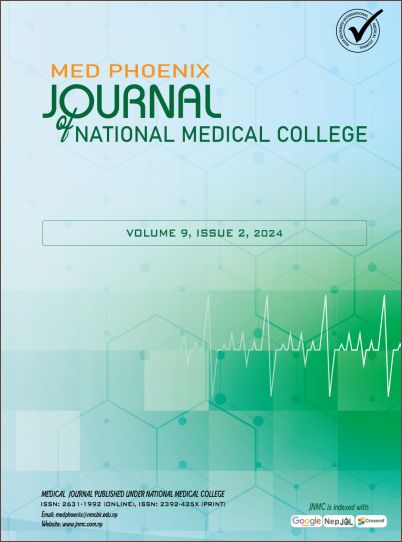Toxicological Assessment, Medication Adherence and Non-Adherence in Chronic Kidney Disease Patients: A Cross-Sectional Study
DOI:
https://doi.org/10.3126/medphoenix.v9i2.73410Keywords:
Chronic Kidney Disease, Management Practice, Medication Adherence, Non-Adherence, ToxicologyAbstract
Introduction: Chronic kidney disease (CKD) poses significant global and national health challenges, with high prevalence, morbidity, mortality, and healthcare costs. Its management is complicated by co-morbidities and patient non-adherence to treatment regimens, compounded by toxicological issues such as medication side effects and drug interactions.
Materials and Methods: This study, conducted at the Universal College of Medical Sciences and Teaching Hospital, involved 170 randomly selected patients. Data from medical records and interviews focused on adherence and toxicological concerns, with the 8-item Morisky Medication Adherence Scale assessing adherence. Toxicological effects were evaluated through patient self-reports and record reviews, with SPSS version 20.0 used for data analysis.
Results: The study showed that 85% of hypertensive patients were on non-ACEI regimens, while 25% with both diabetes and hypertension managed with insulin plus non-ACEI regimens. Only 32.9% adhered to prescribed regimens, citing high medication costs (51%) and toxicological concerns (12%) as primary reasons for non-adherence. Younger patients, specific occupations (e.g., teachers), and higher education levels correlated with better adherence.
Conclusion: The study highlights the prevalence of medication use and adherence in CKD patients, emphasizing the need for cost-effective strategies and toxicological monitoring to improve adherence and patient outcomes.
Downloads
Downloads
Published
How to Cite
Issue
Section
License
Copyright (c) 2024 Med Phoenix

This work is licensed under a Creative Commons Attribution-NonCommercial 4.0 International License.
This license enables reusers to distribute, remix, adapt, and build upon the material in any medium or format, so long as attribution is given to the creator.
Copyright on any research article is transferred in full to MED PHOENIX upon publication. The copyright transfer includes the right to reproduce and distribute the article in any form of reproduction (printing, electronic media or any other form).




